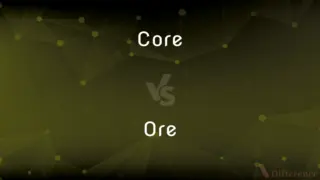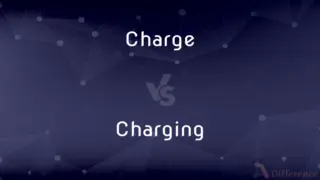Torque vs. Torsion — What's the Difference?
By Tayyaba Rehman — Updated on September 21, 2023
Torque refers to the twisting force causing rotation, while torsion describes the act or state of being twisted.

Difference Between Torque and Torsion
Table of Contents
ADVERTISEMENT
Key Differences
Torque is a concept often used in mechanics and physics. It represents the amount of force applied to an object that causes it to rotate around an axis. When you use a wrench to tighten a bolt, you apply torque to make the bolt turn. The effectiveness of this turning force depends on how much force is applied and at what distance from the rotation axis.
On the other hand, torsion points to the action or the state of twisting or being twisted. It is more about the deformation experienced by an object when two parts of it are turned in opposite directions about its longitudinal axis. When an object undergoes torsion, it can experience stress and strain due to the twisting.
To clarify further, torque is the force that you would apply to create rotation or twisting, whereas torsion is the result or the state of that twisting. Torque is a vector quantity, having both magnitude and direction, and can be quantified in units like Newton-meters. Torsion, meanwhile, describes a physical phenomenon and its effects, such as torsional stress or torsional strain.
In everyday applications, understanding torque is essential for tasks like tightening screws or driving. Engines, for instance, produce torque to spin wheels. Torsion, conversely, is significant in design and material science. For example, engineers consider torsional strength when designing shafts or beams to ensure they can withstand specific twisting forces without failing.
Comparison Chart
Definition
Twisting force causing rotation
Act or state of being twisted
ADVERTISEMENT
Context of Usage
Mechanics and physics
Deformation and material science
Nature
Vector quantity with magnitude and direction
Describes a physical phenomenon
Units
Quantified in units like Newton-meters
Often associated with stress and strain values
Example Application
Turning bolts, engine performance
Shaft and beam design, torsional strength
Compare with Definitions
Torque
Vector quantity associated with rotational force.
The torque applied was 50 Newton-meters in a clockwise direction.
Torsion
Turning force causing deformation in opposite directions.
The beam was designed to handle specific degrees of torsion.
Torque
Force causing rotational motion.
The engine generates torque to turn the car's wheels.
Torsion
Twisting of an object due to applied torque.
The rod exhibited torsion when opposing forces were applied to its ends.
Torque
Rotational equivalent of linear force.
The motor's torque ensures the machine's smooth operation.
Torsion
Act of twisting or state of being twisted.
The candy wrapper showed signs of torsion.
Torque
A measure of how effectively a force causes rotation.
A longer wrench provides more torque due to increased leverage.
Torsion
Deformation resulting from rotational forces.
Torsion caused the metal bar to exhibit stress fractures.
Torque
Turning force dependent on force magnitude and distance from rotation axis.
Moving his hand further from the hinge, he increased the door's torque.
Torsion
A twisted state often resulting in stress and strain.
The material failed under extreme torsion.
Torque
In physics and mechanics, torque is the rotational equivalent of linear force. It is also referred to as the moment, moment of force, rotational force or turning effect, depending on the field of study.
Torsion
The act of twisting or turning.
Torque
The measure of a force's tendency to produce torsion or rotation about an axis, equal to the product of the force vector and the radius vector from the axis of rotation to the point of application of the force; the moment of a force.
Torsion
The condition of being twisted or turned.
Torque
A turning or twisting force.
Torsion
The stress or deformation caused when one end of an object is twisted in one direction and the other end is held motionless or twisted in the opposite direction.
Torque
A collar, a necklace, or an armband made of a strip of twisted metal, worn by the ancient Celts and Germans.
Torsion
The act of turning or twisting, or the state of being twisted; the twisting or wrenching of a body by the exertion of a lateral force tending to turn one end or part of it about a longitudinal axis, while the other is held fast or turned in the opposite direction.
Torque
To impart torque to.
Torsion
(mechanics) That force with which a thread, wire, or rod of any material returns, or tends to return, to a state of rest after it has been twisted; torsibility.
Torque
A rotational or twisting effect of a force; a moment of force, defined for measurement purposes as an equivalent straight line force multiplied by the distance from the axis of rotation (SI unit newton metre or Nm; imperial unit [https://en.wikipedia.org/wiki/Pound-foot_(torque) pound-foot] or lb·ft, not to be confused with the foot pound-force, commonly "foot-pound", a unit of work or energy)
Torsion
(surgery) The stopping of arterial haemorrhage in certain cases, by twisting the cut end of the artery.
Torque
A tightly braided necklace or collar, often made of metal, worn by various early European peoples.
Torsion
The act of turning or twisting, or the state of being twisted; the twisting or wrenching of a body by the exertion of a lateral force tending to turn one end or part of it about a longitudinal axis, while the other is held fast or turned in the opposite direction.
Torque
To make something rotate about an axis by imparting torque to it.
Torsion
That force with which a thread, wire, or rod of any material, returns, or tends to return, to a state of rest after it has been twisted; torsibility.
Torque
A collar or neck chain, usually twisted, especially as worn by ancient barbaric nations, as the Gauls, Germans, and Britons.
Torsion
A tortuous and twisted shape or position;
They built a tree house in the tortuosities of its boughs
The acrobat performed incredible contortions
Torque
That which tends to produce torsion; a couple of forces.
Torsion
A twisting force
Torque
A turning or twisting; tendency to turn, or cause to turn, about an axis.
Torque
A twisting force
Common Curiosities
Are torque and torsion related?
Yes, torque is the applied force causing an object to experience torsion.
What's the primary distinction between torque and torsion?
Torque is the twisting force causing rotation, while torsion refers to the state or act of being twisted.
Can you measure torsion?
Torsion itself describes an action, but the effects, like torsional stress and strain, can be measured.
Is torque only relevant in machinery?
No, torque is a fundamental concept in physics and mechanics, evident in everyday tasks like opening jars or turning door knobs.
Does torsion always lead to object failure?
Not always. Objects designed to withstand torsional forces can handle them without failing.
How do torsional forces impact structures?
Torsional forces can cause deformation, and structures need to be designed to either accommodate or resist these forces.
Are there devices to measure torque?
Yes, devices like torque wrenches or torque meters can measure the amount of torque being applied.
Why do engineers need to understand torque?
Engineers need to design systems and structures that can effectively manage and utilize torque, especially in machinery and vehicles.
Can torsion occur without applied torque?
Typically, torsion results from torque, but objects can also be in a state of torsion due to inherent twists or previous forces.
How is torque represented in equations?
Torque (τ) is often represented as the product of force (F) and the distance (r) from the pivot point: τ = r x F.
Share Your Discovery

Previous Comparison
Core vs. Ore
Next Comparison
Charge vs. ChargingAuthor Spotlight
Written by
Tayyaba RehmanTayyaba Rehman is a distinguished writer, currently serving as a primary contributor to askdifference.com. As a researcher in semantics and etymology, Tayyaba's passion for the complexity of languages and their distinctions has found a perfect home on the platform. Tayyaba delves into the intricacies of language, distinguishing between commonly confused words and phrases, thereby providing clarity for readers worldwide.












































